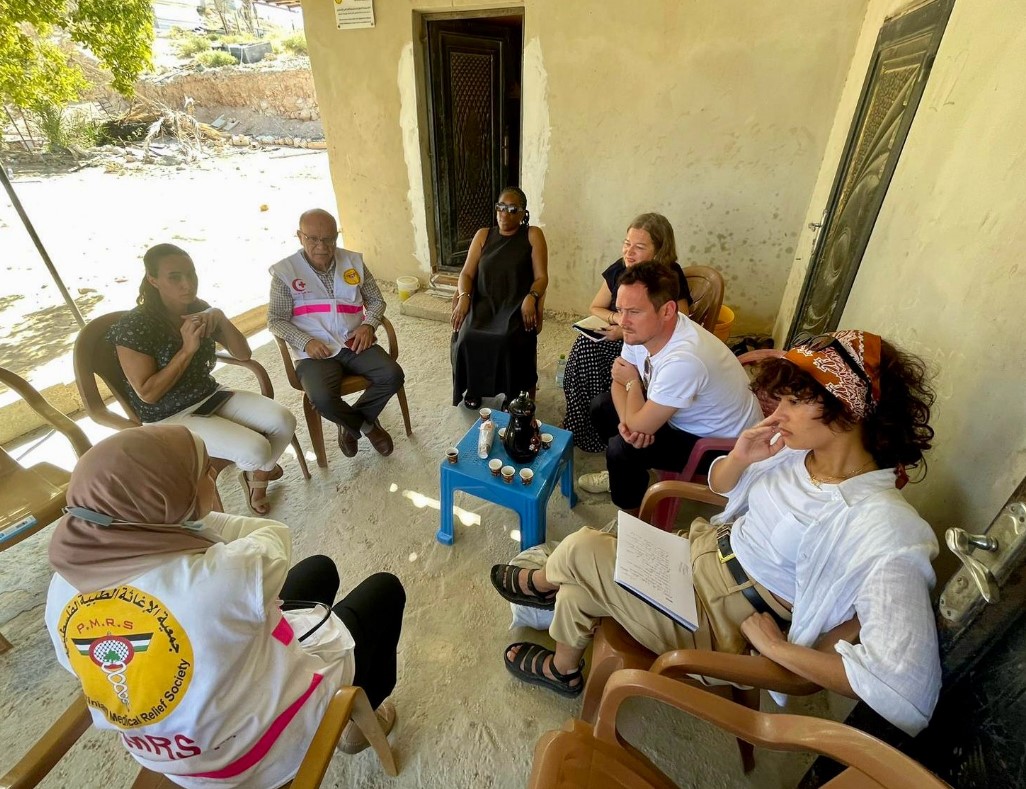
In late September, during a parliamentary recess, I visited the Occupied Palestinian Territories (OPT) as part of a delegation organised by the Council for Arab-British Understanding (CAABU) and Medical Aid for Palestinians (MAP).
On my visit, as a member of Labour Friends of Palestine and the cross-party group for Palestine (APPG), I wanted to understand more about the humanitarian and political situation in the Occupied Palestinian Territories and its impact on the daily lives of Palestinians living under Israeli occupation and as refugees. I was deeply troubled by what I saw and learnt.
Our delegation stayed in East Jerusalem in the West Bank, a Palestinian territory. Even before the humanitarian crisis that has since unfolded in Gaza, we were informed this territory was not safe enough for us to visit.
Our time was split between field visits to towns, villages and refugee camps to see issues and concerns on the ground first-hand, as well have a wide range of meetings with those dedicated to support Palestinians suffering and in need. Our willingness to visit to understand the challenges people and community groups faced was met up warmth and openness.
This included Israeli and Palestinian civil society organisations, the British Consul, local community representatives and a number of healthcare projects supported by Medical Aid for Palestinians themselves.
Medical Aid for Palestinians (MAP) undertake vital work, providing immediate medical aid to those in great need, while also developing local capacity and skills to ensure the long-term development of the Palestinian healthcare system.
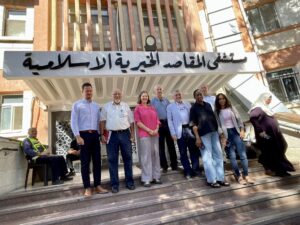 We visited two projects supported by MAP. The first was Makassed Hospital in East Jerusalem, a major referral hospital for the West Bank and Gaza, particularly for pregnant women and sick babies and children.
We visited two projects supported by MAP. The first was Makassed Hospital in East Jerusalem, a major referral hospital for the West Bank and Gaza, particularly for pregnant women and sick babies and children.
There I met with doctors and trainee medics providing essential care to newly born, premature babies. Usually, around 100 patients from Gaza and the West Bank receive care each day for complex health needs such as treatment for rare cancers and open heart surgery, at hospitals like Makassed, according to the World Health Organization (WHO).
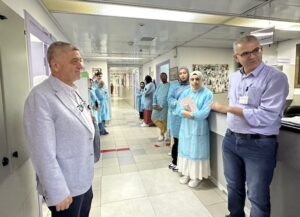 As well as being profoundly moved by seeing very sick babies, I learnt about the hospital’s challenges in providing lifesaving health care due to disruption in services as a result of persisting shortages of supplies.
As well as being profoundly moved by seeing very sick babies, I learnt about the hospital’s challenges in providing lifesaving health care due to disruption in services as a result of persisting shortages of supplies.
The second medical project I visited was a mobile health clinic supported by MAP in a tiny Palestinian village near Jericho in the Jordan Valley.
The clinic is a new van, with a team of two doctors, two healthcare assistants and a lab technician supported by MAP, who visit the village regularly. It was parked up in front of a resident’s house to allow for electricity supply.
The Mobile Health Clinic travels across area C, an area that contains many of the Israeli settlements which are illegal under international law.
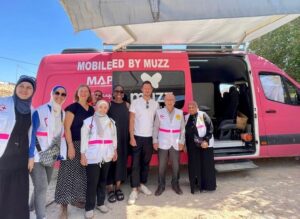 Well used by women in particular, a range of health needs are met there and prescriptions issued. With no permanent Palestinian health facilities in Area C, the visit provided the opportunity to hear about increasing, concerning attacks on health workers, as well as the vital service it provides for those facing discrimination and limited access to healthcare.
Well used by women in particular, a range of health needs are met there and prescriptions issued. With no permanent Palestinian health facilities in Area C, the visit provided the opportunity to hear about increasing, concerning attacks on health workers, as well as the vital service it provides for those facing discrimination and limited access to healthcare.
The Israeli settlements have been rightly condemned by the international community in recent history because they have resulted from the forced eviction and displacement of Palestinians from their homes. The United Nations estimated earlier this year that 700,000 settlers are living across the Occupied West Bank, a figure that has notably increased from 520,000 since 2012.
Growing settlements have brought an increase in violence and displacement of Palestinians in the West Bank, particularly in Area C, accompanied by a dangerous irresponsible and extremist rhetoric including from far-right politicians in the Israeli government.
It became clear to me that Israeli occupation and the illegal settlements in the West Bank are a major obstacle to the availability, accessibility and quality of healthcare for Palestinians. The operation of permits for hospital attendance, the lack of access to mains water in rural areas, and the building permit and demolition scheme cause unnecessary suffering for ordinary Palestinian people.
The continued expansion of such settlements therefore brings into question the Israeli Governments commitment to a two-state solution.
Following the visit to the mobile clinic, we headed up to Huwara, to understand the service provided by the Palestine Red Crescent Society (PRCS) emergency teams who support Palestinians suffering injuries resulting from attacks by Israeli settlers.
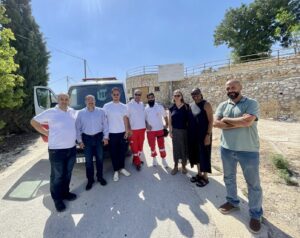 I totally condemn acts of violence and extremism by settlers in the West Bank and have been calling on the Israeli authorities to prevent settler violence, ensure accountability for perpetrators and condemn extremist rhetoric.
I totally condemn acts of violence and extremism by settlers in the West Bank and have been calling on the Israeli authorities to prevent settler violence, ensure accountability for perpetrators and condemn extremist rhetoric.
This violence entrenches division and makes the prospect of a just and lasting peace harder to achieve. The UK government must do all it can to avoid further escalation in the West Bank and the wider region.
On this part of the visit, I met with ambulance crew discussing the pressures they are under as first responders, as well as visiting a pop-up hospital established to deal with injuries as a result of violent riots this year.
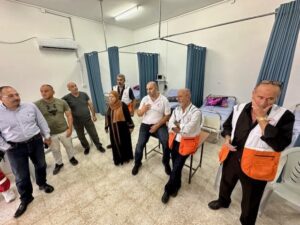
As pressure continues to mount on hospitals and first responders in the West Bank, MAP’s emergency response is as critical as ever. With regular restrictions on the free movement of health workers and ambulances, it was clear equipping local volunteers to stabilise the wounded is essential to saving lives.
In every healthcare system it is essential that care is effective and accessible to the population it serves. But for Palestinians living under occupation or as refugees, it was clear from our visit as a delegation that this access is often denied by the circumstances in which Palestinians live.
MAP and the organisations I met during my time in the West Bank are working to develop sustainable, Palestinian-led healthcare services to meet these needs despite movement and access restrictions.
This work in partnership with local health providers, is evidently helping some of the most marginalised, such as children, women, and those with disabilities and mental health issues. It was hugely informative to see this first-hand and to understand the challenges being faced.
The current situation
Just a week after the visit, Israel was a victim of terrorism on an unimaginable scale at the hands of Hamas, and a humanitarian catastrophe in Gaza has been playing out on an unimaginable scale since.
The horrific events of 7 October, killing the highest number of Jews in a single day since the Holocaust, and the thousands of Palestinian civilians and children that have been killed over the past month, must not set back the efforts I heard about during the delegation.
More than 10,000 people have reportedly been killed in Gaza, with two thirds of the dead being women and children. This is devastating as every civilian death is an equal tragedy. My thoughts are with all those who have been impacted and effected by the events that have unfolded.
I have always believed that lasting peace will require negotiations and a path to an independent Palestine and a secure Israel.
The reality is that neither the long-term security of Israel nor the long-term justice for Palestine can be delivered through violence. A political agreement – however unlikely that seems today – is the only way to resolve this conflict.
They require decision-makers to urgently recharge diplomacy and re-energise efforts for a two-state solution. For too long the international community has ignored the Israel and Palestine question.
As an MP, I will continue to liaise with those I met on my recent visit, and work with MAP and others to raise issues and concerns I learnt about in Parliament.
You read more about some of the actions I’ve taken since here and here. For a full list of the parliamentary questions I have asked, to lobby Government, click here.

